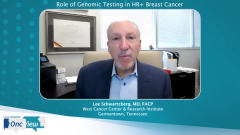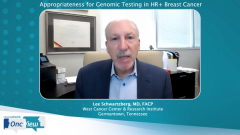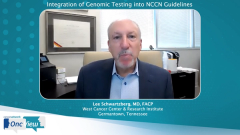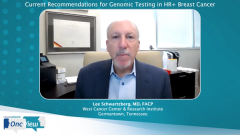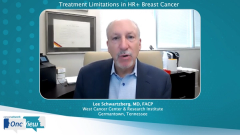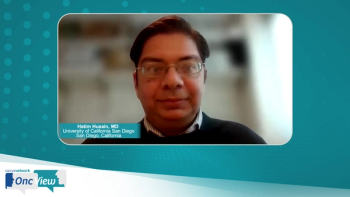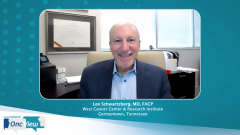
Current Recommendations for Genomic Testing in HR+ Breast Cancer
Current recommendations for conducting genomic testing in patients with HR+ [hormone receptor-positive] breast cancer, as outlined by the NCCN clinical practice guidelines.
Episodes in this series

Kristie Kahl: Based on the NCCN [National Comprehensive Cancer Network] recommendations regarding genomic assays in this setting and the data supporting their use, do you think this should be the new standard of care when making decisions about extended adjuvant therapy in hormone receptor positive breast cancer?
Lee Schwartzberg, MD, FACP: I do believe that the NCCN guidelines reflect accurately the value of genomic assays. When we are talking about extended adjuvant endocrine therapy, that can be a difficult decision. Particularly for those patients who we would think of as being in that intermediate clinical risk for recurrence. I will give you an example of a patient like that. It would be a patient perhaps who had a 3-centimeter tumor. Could be node negative or one node positive. Could have a low-grade tumor or an intermediate-grade tumor. And has had some difficulty getting through the 5 years of the standard adjuvant endocrine therapy. In those cases, those women really do not want to and should not have to take therapy that isn’t going to benefit them. We need to know two things. We need to know first, what is the risk after 5 years of having a recurrence? And remember that in hormone receptor-positive breast cancer over half the relapses and recurrences occur after 5 years. We do have to keep this longer perspective in mind. We also need to know importantly whether a therapy that we are going to give them is going to benefit them. As I mentioned in unselected populations by genomic assays, there is benefit. That benefit is on the order of several percent and on absolute basis. And on a proportional basis is in the 15% to 20% range. That means that most patients who take those drugs, or did take them in the trials that tested extended adjuvant endocrine therapy, didn’t benefit from them. We need biomarker assays that can help us personalize medicine more than we do by treating a whole group to benefit a few. That is where genomic assays really do shine.
BCI [Breast Cancer Index] has also been tested in several datasets in that retrospective, prospective fashion. Including MA.17 [clinical trial], which was the first extended adjuvant endocrine therapy study done. But also showing it in an additional subset like the ATAC trial. BCI has also shown benefit in several other trials including the aTTom trial, which looked at 10 years of tamoxifen versus 5 years and showed a benefit across the board of modest degree but significant. This can help tell us who would benefit from 10 years of adjuvant tamoxifen if one wanted to give that drug compared to 5 years. Then most recently in the IDEAL trial that tested an additional 2 years of adjuvant therapy with an aromatase inhibitor versus an additional 5 years. And showed the benefit for the 5-year group over the 2-year group based on the HI index part of the BCI which gives us the predictive value of using additional endocrine therapy. We have now multiple datasets that show not only prognosis, so we can tell a woman within a range what their risk is of recurring after 5 years and years 5 through 10 as part of the test. But the other part of the test importantly, is predicting whether there would be benefit if you are at high-risk to receive additional adjuvant endocrine therapy. That kind of information is critical for me to make that decision in a shared fashion with a woman who is sitting across from me in the exam room and wants to do everything she can to reduce the risk of recurrence. But certainly, does not want to take medication if it’s not valuable and likely to help her.
Transcript edited for clarity.
Newsletter
Stay up to date on recent advances in the multidisciplinary approach to cancer.


